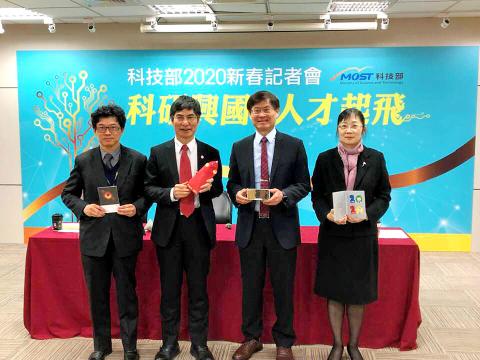The Ministry of Science and Technology (MOST) plans to set up new semiconductor research centers to boost industrial applications of space technology, quantum computing and artificial intelligence (AI), Minister of Science and Technology Chen Liang-gee (陳良基) said yesterday.
Taiwan’s semiconductor industry last year generated revenues totaling NT$2.6 trillion (US$86.78 billion), and that figure is projected to reach NT$5.2 trillion or even NT$6 trillion in the next decade, he told a news conference in Taipei.
While Taiwan’s semiconductors are world-leading, talent cultivation in the sector should be improved, especially when the nation’s space technology, quantum computing, AI technology, smart medicine and machinery, and autonomous driving technology sectors all rely on better chips, he said.

Photo: CNA
After promoting the semiconductor “moonshot” program for nearly two years, the ministry is considering establishing new semiconductor research centers across the nation to create clusters of professionals, he said.
However, the government could do more to increase the basic research budget, Chen said.
In 2018, funding for basic research made up 7.3 percent of the nation’s total research and development funding (including that of companies), the lowest ratio since 2009 and lagging behind South Korea, Japan, the US and the Netherlands, ministry data showed.
While the ministry hopes to increase the basic research budget to NT$29.7 billion this year, up from the NT$25.7 billion approved by the legislature last year, it is unlikely to gain the legislature’s support, he said.
The government plans an average of NT$120 billion every year for technological research and development, with 30 to 35 percent going to basic research and nearly 65 percent to applications, he said.
By comparison, the research and development funding of private firms totals NT$450 billion every year, of which only a few percent is used to support academic research, he said, expressing hope that companies would devote more funding to academic research.
Over the past two years, Chen has traveled to several cities in the US and Europe to recruit young academics.
Ministry data yesterday showed that 27 academics previously studying overseas have been recruited by Taiwanese institutions.
A Japanese academic was recruited by a natural science department. The other 26 are Taiwanese, including seven who are joining natural science departments, 10 joining engineering departments, seven joining life sciences departments and two joining humanities departments, ministry data showed.
Chen said he plans to visit Houston, Boston, Chicago and Seattle in late March to recruit talent.
Describing himself as the longest-serving technology minister — Chen assumed office in February 2017 — and the first tech minister to have obtained his doctorate from a local university, Chen said he hopes his experience will encourage more young people to make breakthroughs.
Asked what his next move would be after the new Cabinet members are sworn in on May 20, Chen said that he would prioritize his academic research, especially in the semiconductor field.

Chinese spouse and influencer Guan Guan’s (關關) residency permit has been revoked for repeatedly posting pro-China videos that threaten national security, the National Immigration Agency confirmed today. Guan Guan has said many controversial statements in her videos posted to Douyin (抖音), including “the red flag will soon be painted all over Taiwan” and “Taiwan is an inseparable part of China,” and expressing hope for expedited reunification. The agency last year received multiple reports alleging that Guan Guan had advocated for armed reunification. After verifying the reports, the agency last month issued a notice requiring her to appear and explain her actions. Guan

GIVE AND TAKE: Blood demand continues to rise each year, while fewer young donors are available due to the nation’s falling birthrate, a doctor said Blood donors can redeem points earned from donations to obtain limited edition Formosan black bear travel mugs, the Kaohsiung Blood Center said yesterday, as it announced a goal of stocking 20,000 units of blood prior to the Lunar New Year. The last month of the lunar year is National Blood Donation Month, when local centers seek to stockpile blood for use during the Lunar New Year holiday. The blood demand in southern Taiwan — including Tainan and Kaohsiung, as well as Chiayi, Pingtung, Penghu and Taitung counties — is about 2,000 units per day, the center said. The donation campaign aims to boost

The Kaohsiung Tourism Bureau audited six hotels in an effort to prevent price gouging ahead of Korean band BTS’ concert tour in the city scheduled for Nov. 19, 21 and 22 this year. The bureau on Friday said that the audits — conducted in response to allegations of unfair pricing posted on social media — found no wrongdoing. These establishments included the local branches of Chateau de Chine, Hotel Nikko, My Humble House, and Grand Hai Lai, it said, adding that the Consumer Protection Commission would have penalized price gougers had the accusations been substantiated. The bureau said the Tourism Development Act

The Central Weather Administration (CWA) said a magnitude 4.9 earthquake that struck off the coast of eastern Taiwan yesterday was an independent event and part of a stress-adjustment process. The earthquake occurred at 4:47pm, with its epicenter at sea about 45.4km south of Yilan County Hall at a depth of 5.9km, the CWA said. The quake's intensity, which gauges the actual effects of a temblor, was highest in several townships in Yilan and neighboring Hualien County, where it measured 4 on Taiwan's seven-tier intensity scale, the CWA said. Lin Po-yu (林柏佑), a division chief at the CWA's Seismological Center, told a news conference